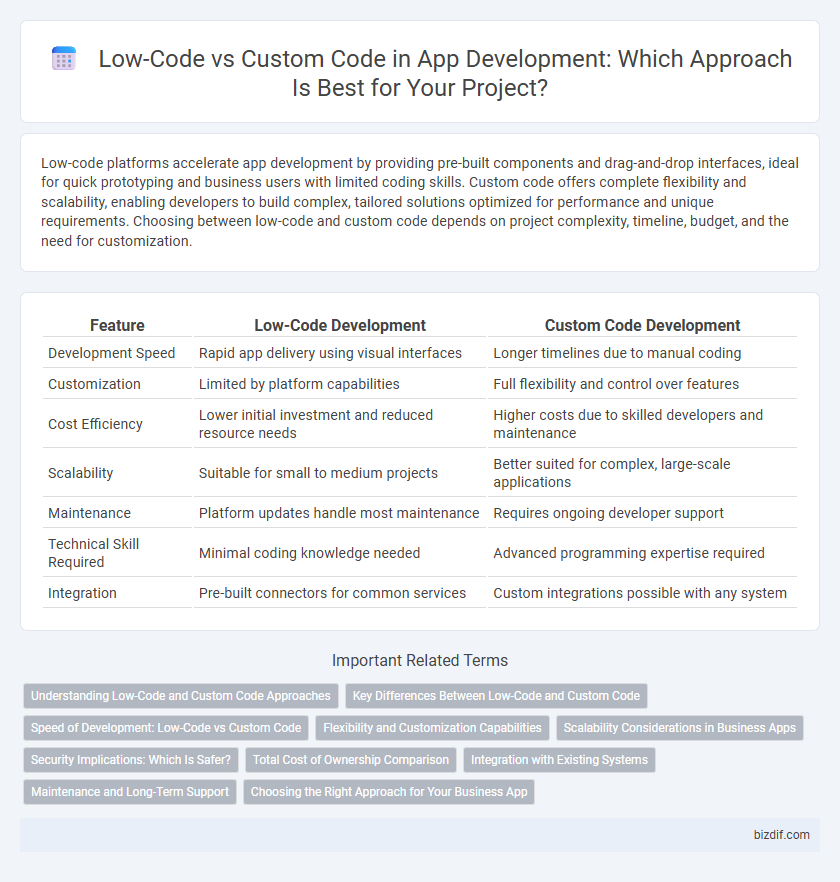Low-code platforms accelerate app development by providing pre-built components and drag-and-drop interfaces, ideal for quick prototyping and business users with limited coding skills. Custom code offers complete flexibility and scalability, enabling developers to build complex, tailored solutions optimized for performance and unique requirements. Choosing between low-code and custom code depends on project complexity, timeline, budget, and the need for customization.
Table of Comparison
| Feature | Low-Code Development | Custom Code Development |
|---|---|---|
| Development Speed | Rapid app delivery using visual interfaces | Longer timelines due to manual coding |
| Customization | Limited by platform capabilities | Full flexibility and control over features |
| Cost Efficiency | Lower initial investment and reduced resource needs | Higher costs due to skilled developers and maintenance |
| Scalability | Suitable for small to medium projects | Better suited for complex, large-scale applications |
| Maintenance | Platform updates handle most maintenance | Requires ongoing developer support |
| Technical Skill Required | Minimal coding knowledge needed | Advanced programming expertise required |
| Integration | Pre-built connectors for common services | Custom integrations possible with any system |
Understanding Low-Code and Custom Code Approaches
Low-code development platforms enable rapid application creation using visual interfaces and pre-built components, significantly reducing the need for extensive programming expertise. Custom code development involves writing detailed, tailored code to meet specific business requirements, offering greater flexibility and control over functionality and performance. Understanding both approaches helps businesses balance speed and customization to choose the optimal solution for their app development projects.
Key Differences Between Low-Code and Custom Code
Low-code platforms enable faster app development by using visual interfaces and pre-built components, while custom code offers complete flexibility and control over the application's functionality. Low-code is ideal for rapid prototyping and business users with limited coding skills, whereas custom coding is preferred for complex, highly customized solutions requiring deep technical expertise. Key differences include development speed, scalability, maintainability, and the level of customization achievable.
Speed of Development: Low-Code vs Custom Code
Low-code development platforms drastically reduce speed of development by enabling visual interfaces and pre-built components, allowing faster prototyping and deployment. Custom code offers more flexibility and control but requires greater time investment for designing, coding, and testing from scratch. Choosing low-code accelerates time-to-market, especially for business applications needing quick iteration, while custom code suits complex, tailored solutions with longer development cycles.
Flexibility and Customization Capabilities
Low-code platforms offer rapid development with pre-built templates and drag-and-drop features, yet they often lack the deep flexibility and extensive customization available in custom-coded applications. Custom code enables developers to tailor every aspect of the app's functionality, design, and integrations to meet unique business requirements and complex workflows. Businesses requiring highly specialized features or seamless integration with legacy systems benefit most from custom code's comprehensive customization capabilities.
Scalability Considerations in Business Apps
Low-code platforms offer rapid development and easier scalability for business apps by using pre-built components and cloud infrastructure. Custom code provides greater flexibility in handling complex, high-scale applications with unique requirements but often requires more resources for scaling and maintenance. Businesses must assess their scalability needs, balancing speed of deployment against long-term performance and customization demands.
Security Implications: Which Is Safer?
Low-code platforms offer pre-built security features and regular updates that reduce vulnerabilities, but they may expose applications to risks due to limited customization and dependence on the platform provider. Custom code enables tailored security measures, granting developers control over encryption, authentication, and data protection, yet it requires rigorous expertise to avoid flaws and misconfigurations. Organizations must assess their security requirements, developer skills, and compliance standards to determine if the controlled environment of low-code or the flexibility of custom code better aligns with their risk management strategy.
Total Cost of Ownership Comparison
Low-code platforms significantly reduce the total cost of ownership (TCO) by minimizing development time, lowering maintenance costs, and requiring less specialized technical expertise compared to custom code solutions. Custom coding often incurs higher expenses due to extensive development cycles, ongoing debugging, and frequent updates needed to adapt to evolving business requirements. Assessing TCO involves evaluating not only initial development costs but also long-term scalability, support, and integration expenses unique to each approach.
Integration with Existing Systems
Low-code platforms facilitate faster integration with existing systems through pre-built connectors and APIs, reducing complexity and deployment time. Custom code offers greater flexibility for tailoring integrations to unique legacy systems but requires specialized development resources and longer timelines. Choosing between low-code and custom code depends on the organization's need for speed versus customization depth in system interoperability.
Maintenance and Long-Term Support
Low-code platforms simplify maintenance by providing visual interfaces and pre-built components, reducing the need for extensive coding knowledge during updates and troubleshooting. Custom code demands specialized expertise for ongoing support, often increasing complexity and costs as applications scale. Long-term support favors low-code solutions for faster iterations, while custom code offers greater flexibility but requires dedicated resources for sustainable upkeep.
Choosing the Right Approach for Your Business App
Low-code platforms accelerate app development by providing visual interfaces and pre-built modules, ideal for businesses seeking rapid deployment and limited coding expertise. Custom code offers unparalleled flexibility and scalability, better suited for complex requirements and long-term growth strategies. Evaluating project complexity, budget, timeline, and future maintenance guides businesses in selecting the optimal approach for their app development needs.
Low-Code vs Custom Code Infographic

 bizdif.com
bizdif.com